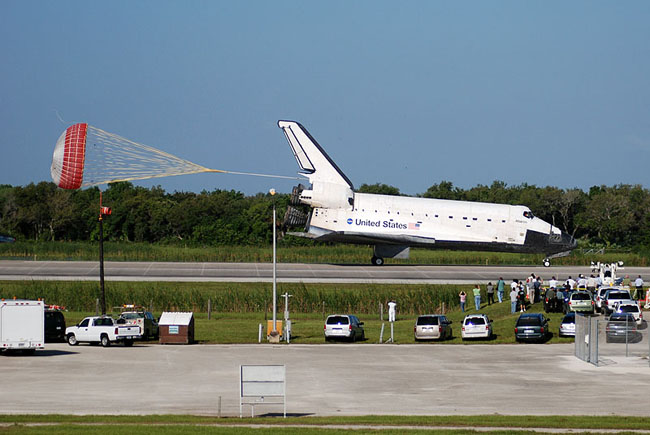NASA Delays Space Shuttle Program's End to 2011

Thisstory was updated at 1:04 p.m. ET.
NASA'sspace shuttle fleet will continue flying through at least early next year dueto delays with the agency's final two missions.
Spaceshuttle program managers officially decided Thursday to delay the launch ofNASA's next space shuttle mission to Nov. 1 and push back the last scheduledflight to late February 2011.
Themove was not unexpected ? the space agency said in late June it was hoping to postpone the finalshuttle flightsbecause of cargo delivery and schedule conflicts. Both missions are bound forthe International Space Station.
Thenew plan delays the launch of Discovery ? NASA's oldest space shuttle ? from anearlier Sept. 16 target to Nov. 1.
Discovery'sSTS-133 mission is the orbiter's last scheduled flight and will deliver ashuttle cargo pod refitted to serve as a permanent storage closet for the spacestation. The shuttle will also deliver Robonaut 2, a prototype robot designedto assist astronauts working in space.
Delayspreparing Discovery's cargo for launch forced mission managers to push thelaunch date back. That shift forced another delay with NASA's final space shuttlemissionon the schedule ? the launch of Endeavour to deliver a $1.5 billionastrophysics experiment to the space station.
Get the Space.com Newsletter
Breaking space news, the latest updates on rocket launches, skywatching events and more!
Endeavouris NASA's youngest space shuttle and was slated to launch its experimentpayload, called the Alpha Magnetic Spectrometer, no earlier than Nov. 27. Butbecause Discovery's flight is delayed, so too is Endeavour's STS-134 mission.
Thenext available launch date for Endeavour is Feb. 26, 2011, NASA officials saidin a statement.
Launchslips for NASA's last space shuttle missions were anticipated by more than justmission managers.
InFebruary, President Barack Obama included $600 million for NASA's space shuttleprogram as part of the agency's fiscal year 2011 budget proposal. The funds wereset aside in case NASA needed to delay its final shuttle flights beyond theirplanned September 2010 retirement date.
Areport issued in March by NASA's Office of the Inspector General also predictedthat the space agency would have to fly some if its finalshuttle missions in 2011.
NASAtypically spends about $200 million a month to keep its space shuttle fleetflying, though agency officials have said they have enough funding in place tosupport operations through February 2011.
NASAis still waiting to hear from the White House if the space shuttle Atlantis ?the current middle child of the U.S. orbiter fleet ? will get a chance fly onemore mission.
Atlantisflew its 32nd and final scheduled mission in May to deliver a new Russian roomto the International Space Station. NASA is hoping to get a chance to launchthe shuttle one more time in June 2011 to deliver cargo and supplies to theorbiting lab. [Photos: Last Launchof Shuttle Atlantis]
Butto give Atlantis one extra shuttle flight, NASA needs approvalfrom the White House, which it does not yet have, by August to begin planningthe mission.
NASAis retiring its space shuttle fleet after 30 years of service to make way forfuture programs aimed at sending astronauts to visit an asteroid by 2025, thentarget missions to Mars.
Theplan is part of President Obama's new space exploration proposal, whichalso includes the cancellation of NASA's Constellation program developing newrockets and spaceships slated to send astronauts back to the moon.
Oncethe space shuttles retire for good, NASA will rely on Russia's Soyuz spacecraftto ferry astronauts to and from the space station until American commercialspaceships become available.
- Gallery - Photos From the Last Launch of Atlantis
- What Will NASA Do With the Retired Space Shuttles?
- POLL: Should NASA Retire the Space Shuttles?
Join our Space Forums to keep talking space on the latest missions, night sky and more! And if you have a news tip, correction or comment, let us know at: community@space.com.

Tariq is the Editor-in-Chief of Space.com and joined the team in 2001, first as an intern and staff writer, and later as an editor. He covers human spaceflight, exploration and space science, as well as skywatching and entertainment. He became Space.com's Managing Editor in 2009 and Editor-in-Chief in 2019. Before joining Space.com, Tariq was a staff reporter for The Los Angeles Times covering education and city beats in La Habra, Fullerton and Huntington Beach. In October 2022, Tariq received the Harry Kolcum Award for excellence in space reporting from the National Space Club Florida Committee. He is also an Eagle Scout (yes, he has the Space Exploration merit badge) and went to Space Camp four times as a kid and a fifth time as an adult. He has journalism degrees from the University of Southern California and New York University. You can find Tariq at Space.com and as the co-host to the This Week In Space podcast with space historian Rod Pyle on the TWiT network. To see his latest project, you can follow Tariq on Twitter @tariqjmalik.









